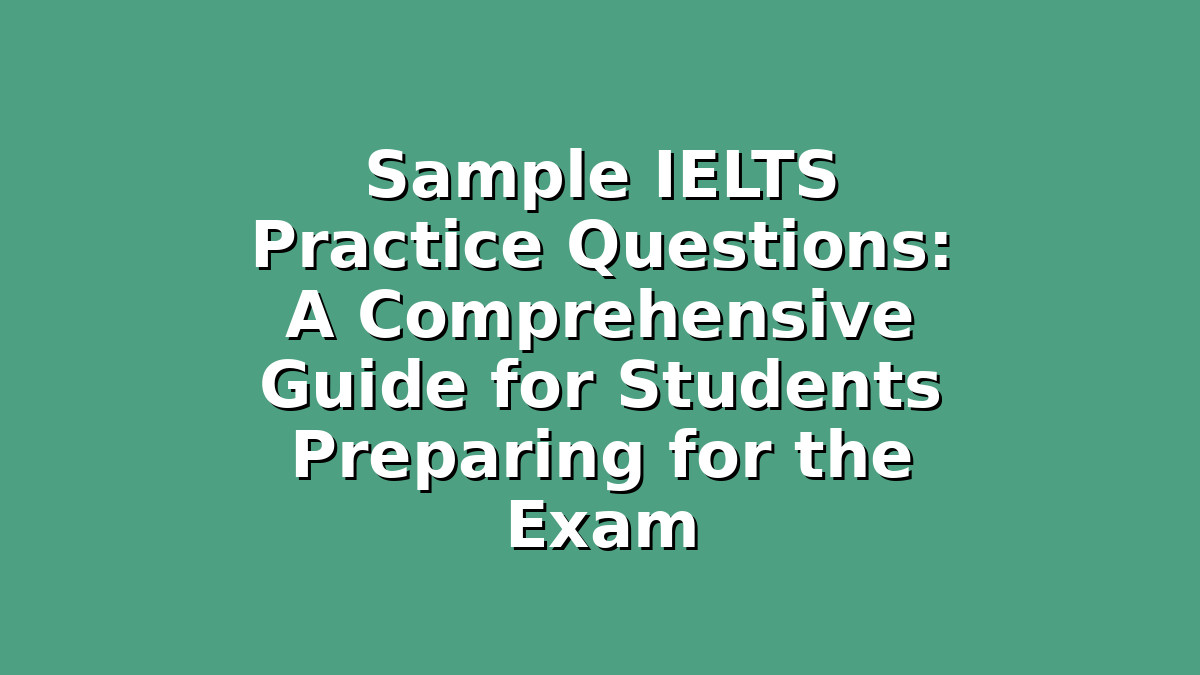Preparing for the IELTS exam can be both exciting and challenging. Whether you are aiming to study abroad, apply for a job, or simply prove your English proficiency, practicing with sample IELTS questions is essential for success. This article will guide you through effective strategies to use sample questions for your IELTS preparation, helping you to build confidence and improve your skills across all four sections of the test: Listening, Reading, Writing, and Speaking.
Understanding the Importance of Sample IELTS Practice Questions
Before diving into sample questions, it’s important to understand why they are crucial for your preparation. The IELTS exam tests your ability to communicate effectively in English in academic and everyday contexts. Familiarizing yourself with the types of questions you’ll face reduces surprises on exam day and helps you manage your time efficiently.
Sample questions provide insight into the test format, question styles, and difficulty level. They allow you to identify your strengths and weaknesses, so you can focus your study time on areas that need improvement. Furthermore, practicing with real-looking questions builds your stamina and improves your test-taking strategies, such as scanning for keywords or structuring your essay responses.
Section 1: Using Sample Listening Questions to Improve Focus and Comprehension
The IELTS Listening test includes four recorded sections, each increasing in difficulty. You will listen to conversations, monologues, and academic talks, then answer questions ranging from multiple-choice to matching and labelling diagrams. Sample listening questions are particularly useful for training your ear to different English accents and speeds.
How to Practice Effectively:
– Simulate Exam Conditions: Use authentic IELTS listening practice materials and try to complete the section in one sitting without pausing the audio. This helps build concentration and prepares you for the time constraints.
– Take Notes Efficiently: While listening, jot down keywords, numbers, and names. Don’t write full sentences; focus on capturing the essence so you can answer questions quickly.
– Review and Learn from Mistakes: After completing sample questions, check your answers carefully. Replay the audio if necessary to understand why you got an answer wrong. This will sharpen your listening skills and boost your accuracy.
– Expand Vocabulary and Context Understanding: Many listening questions test your ability to understand synonyms and paraphrases. Practice identifying different ways of expressing the same idea by listening to various English media sources.
Section 2: Enhancing Reading Skills Through Sample IELTS Reading Questions
The IELTS Reading test consists of three long passages taken from books, journals, magazines, or newspapers. Questions test your ability to find information, understand the main ideas, recognize writers’ opinions, and interpret data. Engaging regularly with sample reading questions helps you improve speed and comprehension.
Effective Study Tips:
– Practice Skimming and Scanning: Sample questions often require you to find answers quickly. Skimming helps you get the general idea of a passage, while scanning allows you to locate specific details. Practice these techniques using timed reading exercises from sample questions.
– Focus on Different Question Types: Common IELTS reading questions include True/False/Not Given, multiple choice, matching headings, and sentence completion. Each type requires a different strategy. Work through sample questions of each type to become comfortable with their demands.
– Develop Your Inference Skills: Some questions ask you to infer meaning or identify the writer’s attitude. Use sample questions to practice reading between the lines and understanding implied meanings.
– Build Academic Vocabulary: The reading passages often include complex words and phrases. Keep a vocabulary journal where you write down new words from sample reading texts and their meanings, and review it regularly.
Section 3: Mastering Writing and Speaking with Sample IELTS Questions
The Writing and Speaking sections are interactive and require you to express your ideas clearly and coherently. Sample questions give you the chance to practice organizing your thoughts and using appropriate language and grammar.
Writing Practice Tips:
– Understand the Task Requirements: In Writing Task 1 (Academic), you may need to describe graphs, charts, or processes. Task 2 requires writing an essay on a given topic. Use sample questions to practice structuring your responses with an introduction, body paragraphs, and conclusion.
– Work on Clarity and Cohesion: Use linking words and phrases to connect ideas smoothly. Sample questions can help you experiment with different ways to organize information logically.
– Time Yourself: Writing within the time limit is crucial. Practice completing tasks using sample questions under timed conditions to build your writing speed without sacrificing quality.
– Seek Feedback: If possible, have a teacher or peer review your writing practice based on sample questions. Constructive criticism helps you improve grammar, vocabulary, and coherence.
Speaking Practice Tips:
– Familiarize Yourself with IELTS Speaking Format: The speaking test has three parts: introduction and interview, long turn (speaking on a topic for 1–2 minutes), and a discussion. Sample questions provide practice for all these parts.
– Practice Speaking Aloud: Use sample questions to rehearse answers aloud. Record yourself to evaluate pronunciation, fluency, and grammatical accuracy.
– Expand Your Answers: Avoid short responses. Sample questions often encourage elaboration. Practice giving detailed answers with examples and explanations.
– Build Confidence: Regular practice with sample speaking questions reduces anxiety and helps you speak naturally during the actual test.
Conclusion
Using sample IELTS practice questions is one of the most effective ways to prepare for the exam. They not only familiarize you with the test format but also help you build key skills across listening, reading, writing, and speaking. By simulating real exam conditions, reviewing mistakes, and continuously practicing, you will increase your confidence and improve your chances of achieving a high score.
Remember, consistent practice paired with smart study strategies is the key to success. Start incorporating sample IELTS questions into your study routine today, and you’ll be well on your way to acing your IELTS exam!

Responses